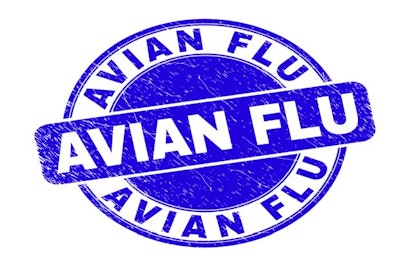
As more highly pathogenic avian influenza (HPAI) outbreaks occur in South Korea, the authorities have announced that the daily disinfection of all poultry farms will continue for at least the next two weeks.
Since November, Yonhap has reported 73 confirmed outbreaks linked to the H5N8 virus variant in South Korean poultry. According to the news agency, the most recent cases were at a duck farm in Hapyeong county in South Jeolla province. Four more outbreaks are suspected in Gyeonggi, which is the province that surrounds the capital, Seoul.
Over the past week, the number of poultry culled to halt the spread of HPAI in South Korea has risen by around three million to 22 million. This total includes 12.8 million chickens, culled under the national policy to destroy all poultry within a three-kilometer radius of each confirmed outbreak.
From today, South Korea traders can import tariff-free up to 50,000 tons of fresh eggs and selected egg products. The government recently agreed to lift these tariffs in order to stabilize the market for poultry products. Egg prices are 27% higher than one year ago, reports Yonhap. Tariffs will not be restored until June.
HPAI spreads to more Indian states
In India, HPAI has now been detected in poultry in nine states — Kerala, Haryana, Madhya Pradesh, Maharashtra, Chhattisgarh, Uttarakhand, Gujarat, Uttar Pradesh, and Punjab. This was the situation as reported to Indian Express by the ministry of animal husbandry.
Among wild birds, the same source puts the number of states reporting cases at 12, including those named above and Himachal Pradesh, Delhi, and Jammu and Kashmir.
More recently, bird flu has been identified as the cause of mortality of more than 6,500 wild birds in 17 districts of Rajasthan.
Over the past week, the ministry has officially registered with the World Organisation for Animal Health (OIE) the presence of the H5N8 HPAI virus in crows found dead in Madhya Pradesh and Rajasthan.
Last week, the agency reported to the OIE HPAI outbreaks in poultry linked to the H5N1 virus variant in Maharashtra and Madhya Pradesh, as well as the H5N8 virus in Haryana.
More HPAI outbreaks in Japanese poultry
Earlier this week, Japan Today reported that HPAI had been detected at a poultry farm in Oyabe, which is in Toyama prefecture in the Chubu region of Honshu island.
Latest update from the agriculture ministry puts the number of primary HPAI outbreaks in poultry at 39 — an increase of three from last week. These appear to cover 13 individual premises, as well as a sudden spread in infections to the east of Honshu.
One week ago, ANI News put the number of poultry culled in Japan at 5.8 million. This exceeds the birds lost in the nation’s 2005-2006 HPAI outbreaks, which reached 5.7 million.
In November of 2020, Japan confirmed its first HPAI outbreaks of this winter season in poultry.
Iran, Kuwait report cases
Six further outbreaks of HPAI have been confirmed among Iranian poultry flocks. Affected were four commercial farms with laying hens, one with broilers, and one with turkeys. All were located in different districts in the South Khorasan region. This is located in the east of the country, and borders Afghanistan, and it is where one of Iran’s previous outbreaks occurred.
Directly involved in the latest outbreaks were more than 269,000 poultry. These bring the country’s losses since early December to more than 525,000 poultry at eight farms.
In the past week, the veterinary authority for the State of Kuwait has registered its first cases of HPAI linked to the H5N8 virus variant for almost four years. The virus was detected last November in a backyard flock in the eastern region of Al Jahrah, according to the OIE report.
First HPAI-positive wild birds in China’s Shandong province
Among a large group of wild swans at the Yellow River Delta nature reserve near Dongying city, the H5N8 HPAI virus has been detected for the first time. According to the agriculture ministry’s report to the OIE, 35 of the birds died. This is a new strain of virus to the region.
In November of 2020, the ministry reported that the same virus strain had been found in a wild swan in Yuncheng city in Shanxi province.
Meanwhile, authorities in Hong Kong have declared the HPAI situation in the territory “resolved.” This follows a positive test for the same virus variant in a sample of wild bird droppings at a nature reserve earlier this month.
Two new avian influenza cases in humans
During the first week of the new year, one new case of avian influenza A(H5N6) was reported to the World Health Organization. The patient was a 51-year-old male farmer from Chongqing in China. He was admitted to hospital at the end of December, and his condition was described as critical.
Also in China, a 16-month-old boy from Guangdong province has tested positive for the avian influenza A(H9N2) virus. He was hospitalized at the end of December after developing mild symptoms. The child had had contact with poultry.
According to the Centre for Health Protection in Hong Kong, a further case has been infected with this virus variant. In Fujian province, the infection was confirmed in a 52-year-old woman in early January.
View our continuing coverage of the global avian influenza situation.

















